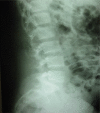Adolescence spinal epidural abscess with neurological symptoms: case report, a lesson to be re-learnt
- PMID: 23483810
- PMCID: PMC3592942
Adolescence spinal epidural abscess with neurological symptoms: case report, a lesson to be re-learnt
Abstract
Epidural abscess of the spinal column is a rare condition that can be fatal if left untreated. It promptly progresses and can cause neurologic paralysis, urinary retention or cauda equina syndrome. Compromised immune system that occurs in patients with diabetes mellitus, AIDS, chronic renal failure, alcoholism, or cancer is a predisposing factor. It mostly occurs in adults. Here we would like to report a case of spontaneous pyogenic lumbar epidural abscess with neurological deficit diagnosed in a 15 year old boy. We treated this case successfully with surgical microscopic decompression and drainage.
Keywords: Antibiotics; Spinal epidural abscess; Spinal infection; Spinal surgery.
Figures
References
-
- Martin RJ, Yuan HA. Neurosurgical care of spinal epidural, subdural, and intramedullary abscesses and arachnoiditis. Orthop Clin North Am. 1996;27:125–36. - PubMed
-
- Chao D, Nanda A. Spinal epidural abscess: a diagnostic challenge. Am Fam Physician. 2002;65(7):1341–6. - PubMed
-
- Soehle M, Wallenfang T. Spinal epidural abscess: clinical manifestations, prognostic factors, and outcomes. Neurosurgery. 2002;51(1):79–87. - PubMed
-
- Vilke GM, Honingford EA. Cervical spine epidural abscess in a patient with no predisposing risk factors. Ann Emerg Med. 1996;27(6):777–80. - PubMed
LinkOut - more resources
Full Text Sources



